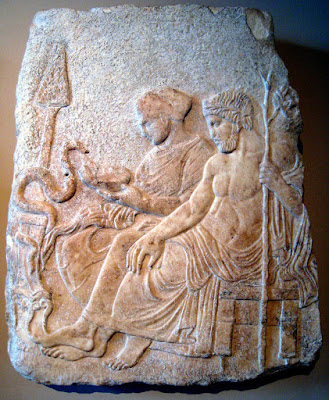As usual, Ovid has woven a thick web of interrelating tales, motifs, parallels and symmetries in
Metamorphoses 5. The more we read him, the more convinced I become that one must not only attend to the particular tales, but to larger patterns, as we saw in the story of Cadmus in Books 3 and 4.
In Book 5, it's at least worth considering the pairing of two stories that at first sight don't seem to have much to do with one another -- the tale of Perseus, Medusa and Andromeda comes first (a good summary can be found
here), followed by Calliope's account of how the Muses triumphed over the Pierides with their song of the rape of Persephone.
Note that the link between the two tales is Athena -- she's with Perseus until his tale ends in Seriphos, then immediately hies to Helicon to see where Pegasus scuffed the ground bringing forth
Hippocrene ("Horse Fountain") the sacred spring. There she meets the Muses. Athena, bearing Medusa's head on the Aegis, is desirous to see where the "child" of Medusa, the winged horse sprung from her blood, touched the earth.
"Volui mirabile factum cernere"
I wanted to see the wonder made there.
Urania, muse of astronomy, points out the place saying,
"Vera tamen fama est,
et Pegasus huius origo fontis"
But the tale is true, Pegasus is the source of this fountain.
Ovid is linking the terror of the Gorgon's visage and death to the fountain of the Muses, thus to art, song, beauty. And he's not alone. In the
12th Pythian Ode, Pindar follows the same pattern. In this Ode, which celebrates the victory of Midas in
αὐλῳδία, an artistic contest of songs with flute accompaniment, Pindar first praises Akragas (Sicilian Agrigentum) as the "splendor loving" home of Persephone. He then turns to the story of Perseus and Medusa to speak of the origin of the song of flutes:
But when the virgin goddess had released that beloved man from those labors, she created the many-voiced song of flutes so that she could imitate with musical instruments the shrill cry that reached her ears from the fast-moving jaws of Euryale
The pattern is clear: Pindar says the "many voiced" music of flutes began in the horror of Perseus's murder of Medusa, and specifically in the hideous wails of her Gorgon-sister, Euryale. In moving from the Perseus-Medusa tale to that of Athena and the Muses, Ovid is retracing Pindar's poetic steps.
What can it mean that music and
Pegasus find their origins linked to the Gorgon raped by Neptune and beheaded by Perseus? If nothing else, we might be reminded of Nietzsche's insight, in his
Birth of Tragedy, that the bright Apollonian gleam of appearance had its source in gazing upon the tragic realm of Dionysus.
So while reading Book 5, it might reward our time to have a look both at
Pindar's Pythian 12 and also at the
Homeric Hymn to Demeter, which provided a great deal of poetic antecedent matter for Ovid's muse.









